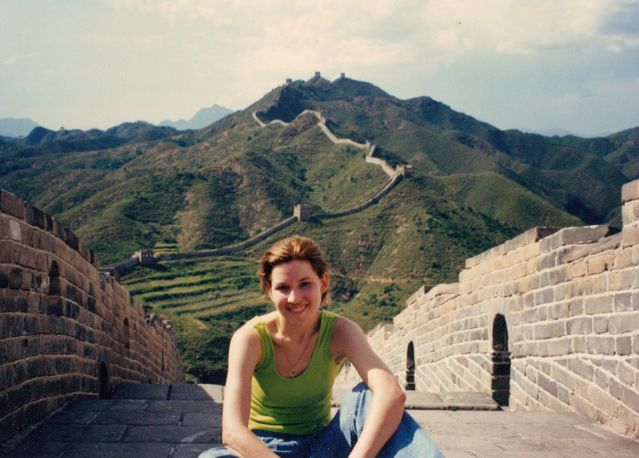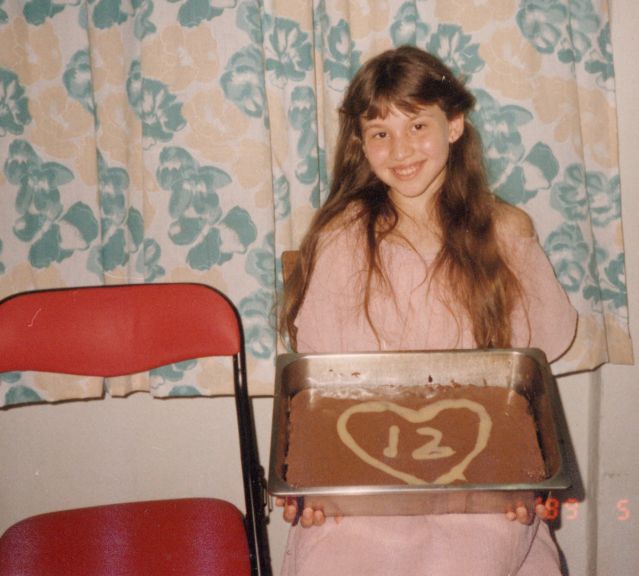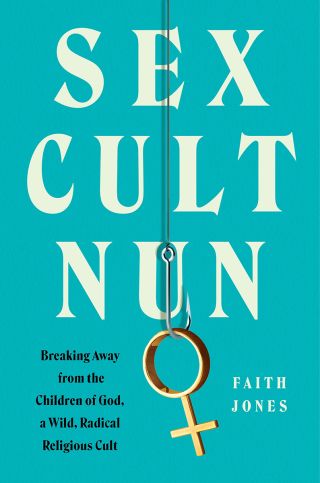How a Sex Cult Survivor Learned to Own Her Body Again
Developing boundaries to recover from cult abuse.
By Faith Jones published November 2, 2021 - last reviewed on February 6, 2024

I grew up in a small Chinese village on the outskirts of the former Portuguese colony of Macau. My parents—my father and his two wives—were members of the Children of God, a Christian, apocalyptic, missionary-focused cult that was founded in California in 1968 and spread around the world. My family had nine children, and we lived communally with other families. We didn’t hold jobs but lived on donations we received while proselytizing, so we could devote ourselves full-time to service to God.
From the moment we woke up until the moment we fell asleep, we were immersed in prayer, songs about Jesus, and hours of religious reading. Prayer came before everything: getting out of bed, eating, doing chores, driving, proselytizing, exercising, having sex, and going to sleep. There was no activity too small to pray over.
We began the day with Devotions—two hours of prayer, singing praise songs, and reading the Word of God, which is the Bible and cult readings. After Devotions were morning chores, called Joyful Job Time, followed by lunch, an hour nap, afternoon work, one hour of exercise, and a shower. We ate all meals together and had an hour of family time or a united evening activity before we retired to our rooms to pray and read the Word of God; then it was lights out. That schedule was the underlying rhythm of our lives.
We lived a form of Christian communism that removed all sense of ownership—everything belonged to God and to the community. Members of the cult had basic personal possessions—clothes, toothbrushes—but no right to anything of value, including money. We were not paid for the work we did. We did not own the products we created. We did not even own ourselves. We were told our bodies were not our own but that we were created to serve others and to make daily sacrifices for God, by which they meant the organization. At any time, anything could be taken away, including a spouse or a child.
The cult viewed sex and nudity as godly and encouraged sexual activity between members whether married or not, even insisting that women give sex to men as a means of sharing the love of God with a needy brother. For some years, this sexual license extended to children.
As children, we were surrounded by images, cartoons, and posters that taught sex was healthy and normal and should be engaged in regularly. When I was five, I had naptimes with my best friend, a boy my age. He and I would play doctor, inspecting each other’s privates while trying not to giggle, or bouncing on each other as we’d seen our parents do.
From childhood, I was trained to politely endure all forms of physical intimacy from male members: breast-crushing hugs, kisses, and groping. But when adult men touched me sexually, or had me touch them, I felt sick. When I was 10, a well-respected adult man in our community stopped me in the kitchen as I was running to play. He’d decided to teach me how to French kiss and forced me to stand still while he shoved his tongue in my mouth. When I tried to refuse, he used a familiar rationale: If my body didn’t belong to me, what right did I have to refuse? That would be selfish and unloving, and therefore, ungodly. This rationale justified the practice of having women, including teenagers, submit to having unwanted sex with the men as an act of service to God—with the added threat of punishment for being unyielding if we didn’t.
By age 23, I was no longer able to take the constant control and surveillance, and, spurred by a burning desire for education, I left the cult to attend college. I’d received almost no formal schooling growing up, but I’d taken high school classes through a self-taught correspondence course to earn a GED equivalent. When I entered mainstream society, I felt like the alien from Robert Heinlein’s novel, Stranger in a Strange Land. I kept my past to myself and forged a new identity, climbed to the top of my class at Georgetown University, attended the University of California Berkeley law school, and secured a job at a prime law firm, Skadden Arps, handling international mergers-and-acquisitions deals worth billions of dollars.
On the outside, I was a success. Yet I struggled internally because I kept seeing glimpses of the same oppressive ideology I grew up with. I saw brilliant students afraid to speak up in class. Accomplished female professionals struggling to ask for a raise. Assertive women, including myself, not knowing how to say no when a man put his hand on their thigh. And, despite the cult’s abusive beliefs, the only time I was held down and forcibly raped was by a man from “normal” society—and the same is true of my mother and sister. I realized that this culture of male entitlement and abuse against women, the concept that women’s bodies exist for the pleasure of men, and the idea that a woman’s purpose is to serve, are prevalent in modern society as well.
I had so many questions. How was I supposed to interact with men, or with society? What are healthy boundaries? No matter how much I studied, no library, classroom, or boardroom could give me answers.
Then, one day, at age 41, flying home from a business workshop, the spark of an idea that had been circling in my brain for weeks coalesced into logical simplicity. Excited, I placed a sheet of paper on the small, grey airline table and drew the first circle.
“I am aware.” Human consciousness is the first thing that we can be certain of. This first sphere, at the center of it all, I labeled Aware.

I drew a second ring around the first that I labeled Body. I, as a conscious being, own my body. To use a legal definition, my body is my property, exclusively. I have the right to control it and to benefit from it. And no one has a right to access it without my freely given permission. Without this right of ownership of our own bodies, there would be no moral wrong in slavery, rape, or murder.
Some people might object to the word property because they feel that it demeans the nature of the body. But to lawyers, the term can apply to anything that has value. It’s not just houses and land or inanimate objects; it also covers intangible things like ideas and one’s reputation.
However, the body is unique. Unlike with other types of “property,” such as inanimate objects, we can never give up our fundamental right of ownership of our body so long as we are alive and our consciousness is connected to it. We cannot be separated from it, except by death.
No one has any rights over my body that I do not freely give them; and I can take away a right over my body at any time. For instance, no one can legally enforce the fulfillment of personal service contracts. If someone contracts Taylor Swift to sing at a birthday party, and she cancels, no one can force her to sing. The hurt party can enforce monetary damages for failure to perform, but they cannot enforce performance; legally, that is too similar to slavery.
Violations of this property right to our body are crimes: assault, murder, rape. Even seemingly “small” forms of sexual harassment, like someone groping me without permission, is a violation of my property right.
I drew a third circle around the smaller two that I titled Creations. Logically, if I own a fruit tree, I also own the fruit it produces. If I own my body, I also own everything my body and mind creates: my services, inventions, art, products, and even my reputation. In the law, violations of this right are theft. Slander is the violation of our reputation through lies. Copyright or patent infringement is stealing our ideas.
I drew a fourth circle and labeled it The Deal. After I create something, I have the right to exchange it for something else I want. Even the Constitution protects our right to contract.
In law school, I learned the five governing principles of a valid agreement. If you are missing any one of these five, you don’t have an enforceable agreement. They are: (1) an offer with a clear object of exchange; (2) acceptance of the offer; (3) an exchange of value; (4) the mental ability to understand the deal; and (5) no undue pressure.
Violations of the Deal include theft, blackmail, fraud, and breach of contract. These principles govern all societal interactions and relationships. Our entire society is based on property rights and exchanges—every relationship, every business deal, and every contract.
Boom! I saw that just as “undue pressure” in the creation of a contract makes the contract unenforceable, when we use manipulation like guilt, lies, and fear of punishment to pressure someone to do what we want, we are in fact stealing from that person.
The final circle I labeled Effect or Impact—how much responsibility people bear for things that they contribute to but that are not fully within their control. For instance, a crime boss might tell a henchman to assassinate someone, even though he doesn’t pull the trigger himself, or a cult leader could tell his followers to molest children even though he doesn’t physically touch each child himself.
When I lifted my pen from the paper, I saw that each thing we consider a moral crime is a violation of one of the spheres of property rights. These principles are not the law; they are the heart of the law. Laws were drafted to codify them. This simple diagram allowed me to understand human rights and the laws governing our society. Armed with this framework, I could answer complex questions that had plagued me for years.
Why did I not feel traumatized by sex play with my childhood friend but did when a sexual interaction involved an adult? Based on the “undue pressure” concept in the creation of an agreement or exchange, I saw that a key component of sexual abuse is power disparity, either real or perceived. This was why I didn’t have any trauma associated with sex play with my childhood peers.
But in a sexual interaction between an adult and a child, the power disparity is inescapable: Children cannot give meaningful consent, and any so-called “consent” involves undue pressure. They also don’t have the ability to understand the ramifications of the act, and this violates the fourth principle: mental ability. So even if children seem willing to engage, they will experience emotional trauma, sometimes delayed, when they realize what was done to them and what was taken from them.
I reflected on my own life and saw with absolute clarity where the violations occurred, who committed them, who was to blame, and who wasn’t. I released residual guilt that I didn’t realize was still buried, even after I’d spoken to therapists who told me the abuse wasn’t my fault. This was an objective standard, not just an opinion.
These five circles make up a lens that can clarify every decision I make. Am I applying coercion or pressure in order to get someone to do what I want? Am I violating their right to make a free decision over what they do with their own time, money, and body? Are they using pressure to violate me?
This kind of interrogation is critical because the flip side of complete ownership of my self is taking complete responsibility for my actions. If I own myself, then I also own everything I do with my body and brain. Just as we cannot give up our property right to our own body, neither can we abdicate moral responsibility for our actions with the excuse, “I’m just doing what I’m told.” This is how many cult members justified their abusive actions: “If God owns my body and is telling me what to do, then it’s God’s responsibility.”
Accountability is scary, but accepting absolute responsibility is power. I realized that if I waited for my abuser to do something in order for me to be happy, I’d be putting the power over my happiness and healing into his hands. Not a smart move. Regardless of what happened to me in the past, the only way to take back my power is by accepting full responsibility for my own happiness right now.
Sharing this framework with my mother and others has opened their eyes to the abuses of the past and allowed us to connect, heal, and move on. Using it to balance rights and responsibilities, I find it simpler to make decisions with integrity. I own me.
Faith Jones is a lawyer and the author of Sex Cult Nun: Breaking Away From the Children of God, a Wild, Radical Religious Cult.

